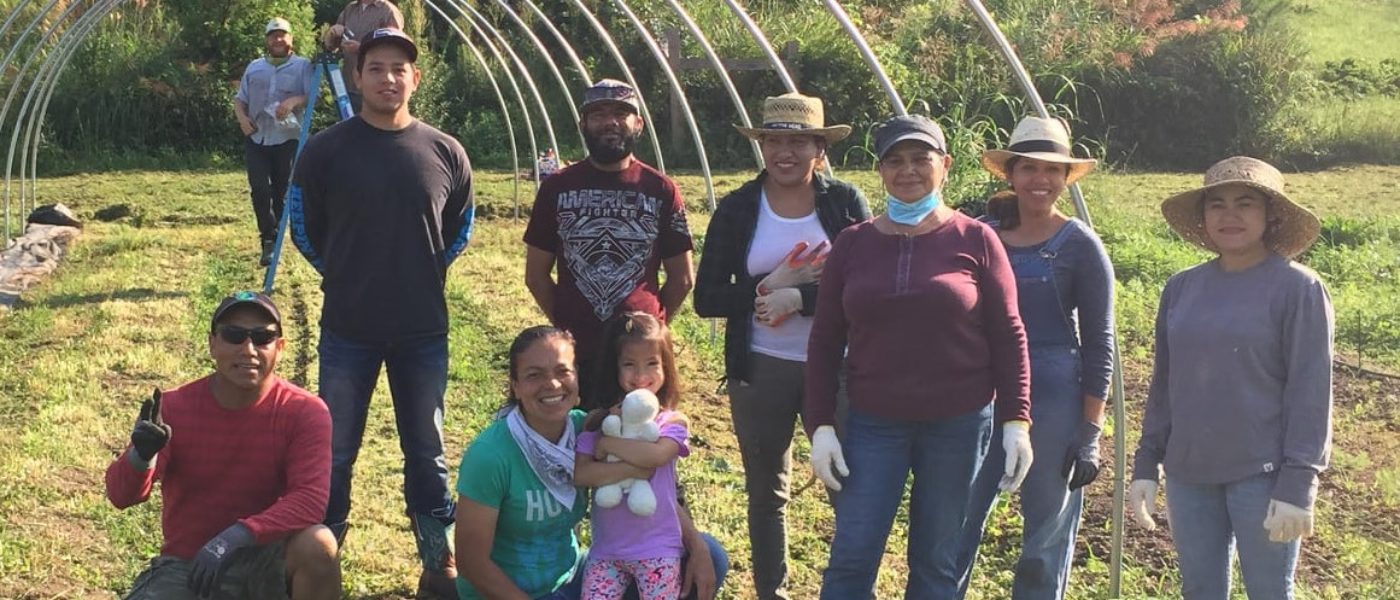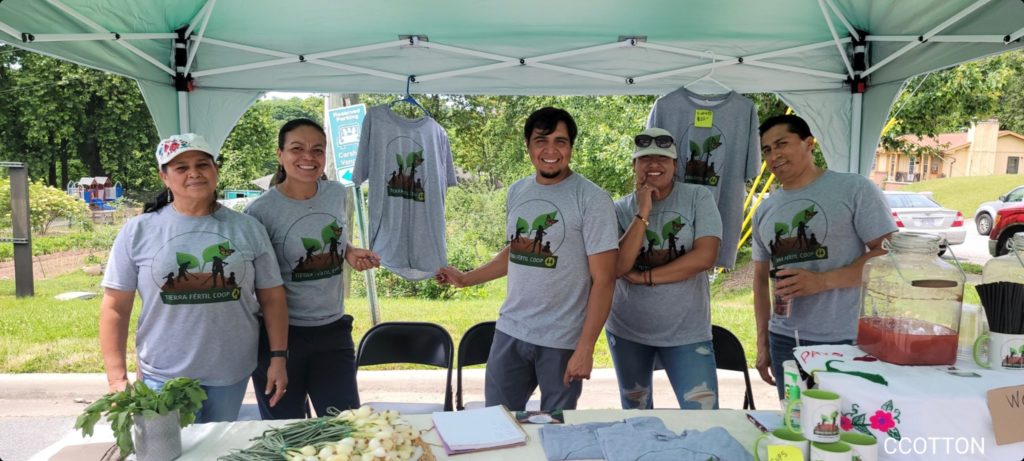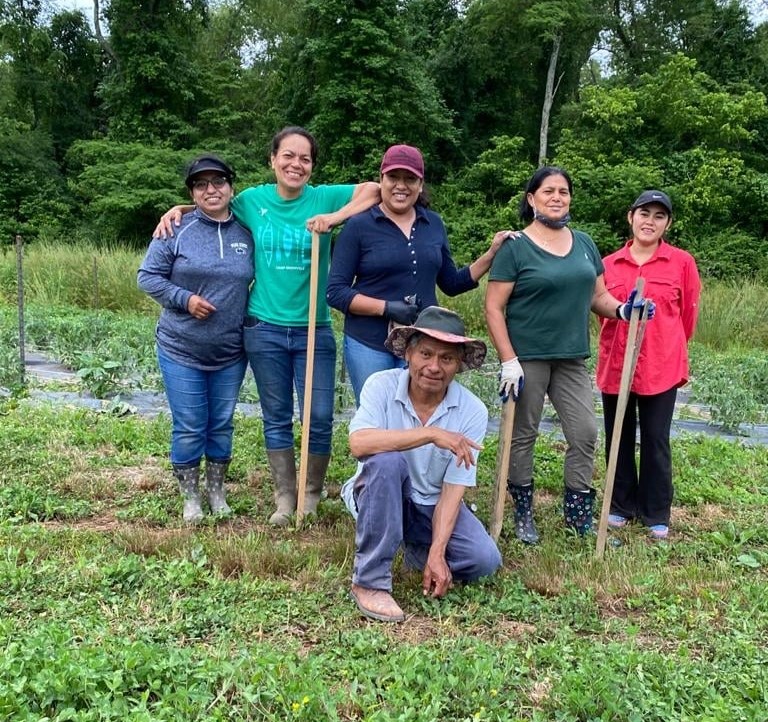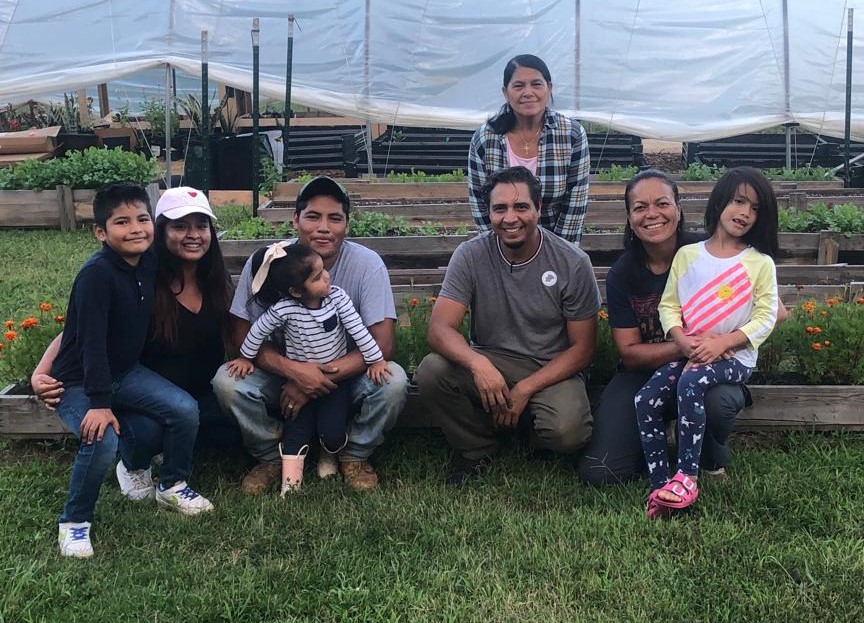Immigrants to the United States have always banded together to support one another, whether in Little Italies and Chinatowns in the cities, or in cooperative farms in the rural countryside. In Hendersonville, North Carolina, Cooperativa Tierra Fértil grew out of a similar impulse toward mutual support during the COVID-19 crisis. “When we started we didn’t necessarily think about becoming a co-op,” says Delia Jovel Dubón, one of Tierra Fértil’s founders. “It was just that we hoped we could work together and that we could support ourselves.”
It wasn’t easy. Dubón found that, thanks to decades of exploitation of immigrant farm workers, many people in Henderson County’s Latino community were skeptical of farming. The attitude seemed to be, “Who would choose to farm if they didn’t have to?” But along the way, the group of Latino farmers who started Tierra Fértil learned that they could not only grow culturally appropriate produce for the Latino population, but that forming a co-op could be the foundation for building “a solidarity economy in an immigrant community,” as Delia puts it.
A Start in Sustaining Her Community
Delia Jovel Dubón grew up in El Salvador, where she studied journalism. Living in the city, she did not have access to land, but she felt passionate about farming – in part because rural cooperatives in surrounding areas were so inspiring. As a result, she said, “I’ve always been very attached to the idea that we can build better initiatives when we work in collaboration.”
When Delia came to the United States, her undocumented status meant that she could not get a job as a journalist. Before she came to Hendersonville eight years ago, she worked a variety of jobs, including as a GED instructor and community organizer. For a while, she worked with an organization in Asheville that was developing housing cooperatives. And then the pandemic hit. Jobs in Hendersonville, as in most places, began to disappear, and fear of homelessness and hunger soon followed.
If necessity is the mother of invention – and inspiration – then the need to build a reliable food source, coupled with the need to be outside and to be in community with each other, opened the door first to starting ABUNDANCIA, a food bank and distribution network for the Latino community, and then with a cooperative farm. ABUNDANCIA began in May 2020, with the intention of providing fresh food – not canned or processed – appropriate to Latino families in the area. At first, thanks to small grants from local donors, ABUNDANCIA provided food to ten families, but by the summer of 2022, it distributed fresh produce to 150 families monthly.
From Food Distribution to Food Production
Not long after beginning the food distribution program at the start of the pandemic, Delia Jovel Dubón began thinking about farming, even though, she admits, she and her friends had no experience. “But when you want to do something that really moves your heart,” she says, “the connections start to become reality.” The key connection came in the form of Tiny Bridge Farms, a diversified, organic farm growing produce for CSAs (Community Supported Agriculture programs) in Hendersonville and Asheville. Impressed with Delia’s food distribution efforts, Tiny Bridge Farms offered to rent one acre of land to the newly formed Cooperativa Tierra Fértil.
In their first year, the farmers of Tierra Fértil planted everything – “every seed that was in our hands!” – but it was too much for folks who still had to work other jobs and could farm only during evenings and on weekends. Building a team in which everyone is in it for the long haul is difficult, and the co-op experienced some turnover in the early going. This year, the co-op’s second year, members decided to focus on crops that require less maintenance. “We decided to plant a lot of Hispanic crops, and it’s interesting, because our buyers are not necessarily Hispanic,” Delia says. They intentionally grow “non-toxic” crops (they do not yet have organic certification), like cilantro, radishes, onions, cabbage, tomatillo, corn, squash, and a variety of peppers. These crops draw customers from the Latino community and beyond to their farmer’s market stands in both Hendersonville and Asheville.
In 2022, Tierra Fértil also began a partnership with Calvary Episcopal Church in nearby Fletcher, so that they could make use of the church’s high tunnel greenhouse and extend their growing season into fall and winter. In order to better reach the Latino community, the co-op now also sells to food pantries and non-profits who serve that population in the area, with the hope that the co-op will soon arrive at a moment when it can serve that community through an array of efforts: direct food distribution, more affordable produce, co-op membership and education. In these efforts, Tierra Fértil has won the support of a range of foundations, organizations, local groups and individuals who continue to support the co-op financially, technically and morally. As a result, the co-op knows it will keep working and thrive.
What It Means to be Cooperative
“After two years, we have created a little capacity that we want to share with others,” Delia explains. Therefore, in the coming year Tierra Fértil plans to shift from a worker-owned co-op to something like a grower co-op, in which other local folks who grow, build, and make things – community producers and creative people who also want to build on a cooperative model – can be a part of what Tierra Fértil has started.
For the members of Cooperativa Tierra Fértil, the journey is as important as the destination. Members practice what sociologists would call “prefigurative politics” – they model, on a one-acre scale, a version of the society they would like to build. “Maybe you’re never going to achieve the goal,” says Delia, “but at least you have left some little grains of sand where you are, and maybe you’re able to build a beach, a little one.”
The first little grains of sand come in the form of education and are left closest to home.
What does it mean to work in a cooperative? “For many people, a coop is just working together with somebody and it’s just that,” Delia observes. “But this is a really intentional solidarity economy: it’s really built on principles of supporting each other, where no one is on top, but it is bringing everyone to the same level.”
But to get residents of Henderson County to accept this notion is a tall order. For one thing, according to Delia, there is not a lot of trust within the Latino community. “In our community, farming is something that is maybe not the most loved job because for many immigrant workers, the reality is that there was a lot of exploitation in farming.” Generations of Latino immigrants worked on farms that were not their own out of economic necessity, not because they chose it as their vocation. But even if it is not the most loved job, Delia says, farming can help move the immigrant community from being distrustful to feeling like they belong. “We want to show that farming is something that’s really rewarding, if it’s done right.”
Doing it right is a way of leaving behind more grains of sand: educational lessons that reach beyond the Latino community. Particularly in recent years, as anti-immigrant sentiment has been whipped up by some politicians, immigrants–with and without papers–face many barriers on the way to getting equal access to work, to a decent standard of living, and to citizenship. As Delia notes, the system provides few pathways for immigrants to demonstrate their capacity to be a positive force in their communities and in the nation.
Delia notes that most Americans don’t know that there is a lot of capacity in the immigrant community; they don’t know for instance that many immigrants, like Delia, were educated and trained in skills that they cannot put to use in the United States because of their undocumented status. “This is the other reason why we created the coop – to be able to show up to do things the right way, to create our own way, and support our community in the right way.” In effect, Tierra Fértil shows that immigrants, documented or undocumented, provide food and a kind of wealth to many communities.
Expanding the Definition of “Family Farm”
More than that, this “tiny initiative” in Hendersonville, North Carolina, may not fit the USDA definition of a “family farm,” but, rather, it expands the definition. “It’s very personal for me because farming is also a way to feel a sense of belonging. It’s like I am doing something on the land that is maybe not mine, that’s not in the country where I was born, but I think the connection that you can have with the soil, and with the land, is a way to feel like home.” While Delia and her fellow co-op members are not a family in terms of blood relations, she notes, “When you are an immigrant, the community becomes your family.” They may be from different countries, with different cultures, she goes on to say, “But you share the same conditions, same needs, and same dreams as well. And that’s where you can become also like a family.”
Beyond the changes they see in themselves and in their community, members of Tierra Fértil want to effect change that is felt across the country. “We know we don’t just farm. That is really clear,” Delia acknowledges. “We don’t just want to grow food. We want to grow that vision of creating a system that can support everybody, no matter where you’re from… a system that supports the well-being of all the people.” It’s not just possible, she points out, but it’s a need. In times like these, Delia believes that building cooperatives is “the only way to thrive, to be able to really move forward.” Doing things by ourselves may make us feel successful, Delia says, “But when you are able to build a network of people who are safe and feel better, you’re going to be proud of that – and you’re going to be telling all of the people that you and they belong.” That’s no tiny initiative.







